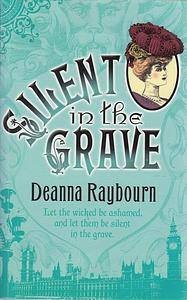Take a photo of a barcode or cover
My part of Japan has been buffeted by tons of typhoons this season. In anticipation of yet another worrying night I started Silent in the Grave and it was just the escapism I needed.
The good:
- World building is here and in spades as Raybourn builds out a corner of Victorian London for us. We don't see a wide swath but we are shown is well crafted and interesting.
- The writing grabbed me from the first line.
- This combination of world building and just-my-style writing made this the perfect escapist read. What, is that a typhoon howling outside? Sorry, I can't hear it, we're on the hunt for a killer!
- In my estimation it's a setting-heavy novel, and they are so rare!
- It's a very feminist tale at heart. Some people have gripped about it being unrealistic or too much for the times, but in our year of 2018 I will take whatever feminist escapism I can get, thank you.
- There are topics I've rarely seen broached in lighter historical fiction, like (happy!) lgbtqia+ folx and flattering depictions of the Romani.
- I didn't have a firm idea who the killer was... but then again, I never do.
The not-so-good:
- The espousing of feminist values will be too much for some. Likewise, historical sticklers will be shocked that a Lady had a conversation about xyz with her brother/servant/whomever.
- If you know a lot about the Victorian era some parts may feel over-explained.
- The plot has a bunch of moving parts and there are many characters to keep straight. It didn't bother me but it may irk some.
- If you're looking for a straight up mystery with lots of investigating you'll be disappointed. This is a bit more holistic. As I keep saying, it was fine by me but others may not care for it.
- Lady Grey doesn't always make the most logical decisions. In fact, she makes a bunch of poor ones, things you can see are wrong off the bat. A couple of them made me sigh but it was never enough to keep me away from the page.
If you're interested in this book the best advice I can give is to hunt down a sample of the first chapter. If you're smitten rock on, but if it leaves you wanting you may want to look elsewhere. Personally I can see the flaws but the world and escapism mixed with mystery made this the right book at the right time. I'll definitely be reading the next one on a long flight or during a period of exceptionally bad existential angst.
The good:
- World building is here and in spades as Raybourn builds out a corner of Victorian London for us. We don't see a wide swath but we are shown is well crafted and interesting.
- The writing grabbed me from the first line.
To say that I met Nicholas Brisbane over my husband's dead body is not entirely accurate. Edward, it should be noted, was still twitching on the floor.
- This combination of world building and just-my-style writing made this the perfect escapist read. What, is that a typhoon howling outside? Sorry, I can't hear it, we're on the hunt for a killer!
- In my estimation it's a setting-heavy novel, and they are so rare!
- It's a very feminist tale at heart. Some people have gripped about it being unrealistic or too much for the times, but in our year of 2018 I will take whatever feminist escapism I can get, thank you.
- There are topics I've rarely seen broached in lighter historical fiction, like (happy!) lgbtqia+ folx and flattering depictions of the Romani.
- I didn't have a firm idea who the killer was... but then again, I never do.
The not-so-good:
- The espousing of feminist values will be too much for some. Likewise, historical sticklers will be shocked that a Lady had a conversation about xyz with her brother/servant/whomever.
- If you know a lot about the Victorian era some parts may feel over-explained.
- The plot has a bunch of moving parts and there are many characters to keep straight. It didn't bother me but it may irk some.
- If you're looking for a straight up mystery with lots of investigating you'll be disappointed. This is a bit more holistic. As I keep saying, it was fine by me but others may not care for it.
- Lady Grey doesn't always make the most logical decisions. In fact, she makes a bunch of poor ones, things you can see are wrong off the bat. A couple of them made me sigh but it was never enough to keep me away from the page.
If you're interested in this book the best advice I can give is to hunt down a sample of the first chapter. If you're smitten rock on, but if it leaves you wanting you may want to look elsewhere. Personally I can see the flaws but the world and escapism mixed with mystery made this the right book at the right time. I'll definitely be reading the next one on a long flight or during a period of exceptionally bad existential angst.
Lady Julia is the centre of this book, and this might seem an odd choice because pretty much every other character has more colour than her. She’s not the sharpest tool in the shed, and her wit is so dormant as to be supposed dead. Her snobbery, though she tries valiantly to combat it and for the most part succeeds, still shines through in places. But she’s self-aware and very funny about her family members, and there’s something about her half-buried character that works very well as a burgeoning amateur sleuth. Other female detectives, like Phryne Fisher (whom admittedly I only know from the show) are brave and smart, liberated and coy and witty – which is lovely, of course. But there’s something of the normal about Lady Julia that is immensely appealing. And her growth into a more confident, fuller person – which I’m sure will come – is well accompanied by the demands murder investigations presumably ask of one. Moreover, there’s the detail of Edward being controlling, perhaps abusive, in his telling her how to dress etc. that is not forgotten in Lady Julia’s character.
Unfortunately, all this time spent on Lady Julia’s inner monologue and diving into her life leaves out properly investigating the murder. It’s a very simple plot; Miss Marple would have it solved in a jiffy and you around to tea afterwards. It’s fine and plausible that Lady Julia takes an absolute aeon to figure it out, but it reflects rather poorly on Nicholas Brisbane, who is supposed to be an accomplished private detective. And yet he detects nothing.
Some notes on the writing: it’s a bit rich coming from someone who hasn’t published any novels, but this is Deanna Raybourn’s first and it shows. There is heavy duty infodumping in the beginning, giving us the background of Julia’s character, marriage and family history. This is not pleasant to get through.
And now I have a (perhaps unfair) bone to pick with the imposition of modern views upon some of the characters. Raybourn makes the historical fiction writer’s effort to show that the characters we like are not nasty racists/misogynists/classists. For example, Lord March (Lady Julia’s father) is shown to support women’s rights by giving his daughters good educations, financial independence and making speeches in favour of women’s suffrage. I find this a bit shallow, a bit of a writerly reassurance to the reader that ‘don’t worry, unlike most old white men, he supports women!’ But why be so simplistic? History is (obviously) not a case of back then vs now. Unfortunately there’s not much attention paid to the historical context of these beliefs; they seem merely to exist on an ideological level. An ideological belief in equal rights is all well and good, but this is a historical novel, and it seems to me a pity that Raybourn does not make mention of coverture, the Property Acts or divorce laws, because that would actually give Lord March’s views some meaning, instead of merely being comfort to our modern sensibilities.
To be fair to this book, some light is cast on this when Lady Julia and Victoria have that conversation about prostitution vs. becoming ‘reformed’ and going into service, and we realise that women do not have a whole lot of options. And perhaps it is a limitation of first person POV that we cannot get into the depths of these social questions – but then why provoke them at all?
Nevertheless, I sped through this, and I’m greatly looking forward to the sequels, where hopefully the mysteries will have a bit more gumption, and so will Lady Julia.
Unfortunately, all this time spent on Lady Julia’s inner monologue and diving into her life leaves out properly investigating the murder. It’s a very simple plot; Miss Marple would have it solved in a jiffy and you around to tea afterwards. It’s fine and plausible that Lady Julia takes an absolute aeon to figure it out, but it reflects rather poorly on Nicholas Brisbane, who is supposed to be an accomplished private detective. And yet he detects nothing.
Some notes on the writing: it’s a bit rich coming from someone who hasn’t published any novels, but this is Deanna Raybourn’s first and it shows. There is heavy duty infodumping in the beginning, giving us the background of Julia’s character, marriage and family history. This is not pleasant to get through.
And now I have a (perhaps unfair) bone to pick with the imposition of modern views upon some of the characters. Raybourn makes the historical fiction writer’s effort to show that the characters we like are not nasty racists/misogynists/classists. For example, Lord March (Lady Julia’s father) is shown to support women’s rights by giving his daughters good educations, financial independence and making speeches in favour of women’s suffrage. I find this a bit shallow, a bit of a writerly reassurance to the reader that ‘don’t worry, unlike most old white men, he supports women!’ But why be so simplistic? History is (obviously) not a case of back then vs now. Unfortunately there’s not much attention paid to the historical context of these beliefs; they seem merely to exist on an ideological level. An ideological belief in equal rights is all well and good, but this is a historical novel, and it seems to me a pity that Raybourn does not make mention of coverture, the Property Acts or divorce laws, because that would actually give Lord March’s views some meaning, instead of merely being comfort to our modern sensibilities.
To be fair to this book, some light is cast on this when Lady Julia and Victoria have that conversation about prostitution vs. becoming ‘reformed’ and going into service, and we realise that women do not have a whole lot of options. And perhaps it is a limitation of first person POV that we cannot get into the depths of these social questions – but then why provoke them at all?
Nevertheless, I sped through this, and I’m greatly looking forward to the sequels, where hopefully the mysteries will have a bit more gumption, and so will Lady Julia.
Lady Julia's husband Edwards collapses at their home, during a dinner party no less, and in swoops the dark and mysterious Nicholas Brisbane to carry Edward to his room. After he dies, Brisbane darkly and mysteriously insinuates Edward may have been murdered! And Julia may be a suspect! Now widowed, Julia decided to pursue the mystery (and the mysterious man) to the end.
The story is narrated in first person, past tense, and reading it brought home to me how much I dislike this kind of narration. Julia relates her story from some distant future point, so everything unrolls in way that kind of squashes the suspense even as it tries to build it. I knew something regrettable, or surprising, or interesting was going to happen on the next page or in the next chapter, because Julia kept telling me it would. Spoiler alert, Julia!
By using first person, Rayburn develops Julia wonderfully- her character is well-rounded, with great strengths and weaknesses often omitted in the typical romance heroine. As a recent widow, Julia has to come to grips not only with her changed social status in 1800s England, but also with the mystery of her husband's death and the truth of his past--and her life with him-- that the mystery reveals. Her transformation from complacent wife to active agent in her self-directed life is a great one to watch.
For all that I did not like the narrative style, Julia's voice is strong; Rayburn is able to convey emotion and action well without sacrificing plot or dumping exposition everywhere. However, because Julia's world and the other characters in it are all related through Julia's POV, I found them flatter and less impressive. Brisbane remained dark and mysterious, sometimes frustratingly so. At times I found it difficult to hold on to him as a romantic foil for Julia because all I got was brooding dark eyes and powerful manly frames, instead of character and motivation.
And the romance! The tension between Julia and Brisbane is electric, even from Julia's limited perspective. But then, at the climax of all this delicious tension, when finally the spark between them ignites and desires are acted upon, do you know what happens? The screen goes dark! He leans in for the kiss and its cut scene! No smoochies, no breathy sighs, no grasping hands. Instead, I'm left with Julia's conflicted thoughts about the kiss and even these are not nearly as descriptive as I want them to be.
By the end, I felt a little cheated by Rayburn. I'm not sure I'll read the rest of books if the romance is given short shrift again.
The story is narrated in first person, past tense, and reading it brought home to me how much I dislike this kind of narration. Julia relates her story from some distant future point, so everything unrolls in way that kind of squashes the suspense even as it tries to build it. I knew something regrettable, or surprising, or interesting was going to happen on the next page or in the next chapter, because Julia kept telling me it would. Spoiler alert, Julia!
By using first person, Rayburn develops Julia wonderfully- her character is well-rounded, with great strengths and weaknesses often omitted in the typical romance heroine. As a recent widow, Julia has to come to grips not only with her changed social status in 1800s England, but also with the mystery of her husband's death and the truth of his past--and her life with him-- that the mystery reveals. Her transformation from complacent wife to active agent in her self-directed life is a great one to watch.
For all that I did not like the narrative style, Julia's voice is strong; Rayburn is able to convey emotion and action well without sacrificing plot or dumping exposition everywhere. However, because Julia's world and the other characters in it are all related through Julia's POV, I found them flatter and less impressive. Brisbane remained dark and mysterious, sometimes frustratingly so. At times I found it difficult to hold on to him as a romantic foil for Julia because all I got was brooding dark eyes and powerful manly frames, instead of character and motivation.
And the romance! The tension between Julia and Brisbane is electric, even from Julia's limited perspective. But then, at the climax of all this delicious tension, when finally the spark between them ignites and desires are acted upon, do you know what happens? The screen goes dark! He leans in for the kiss and its cut scene! No smoochies, no breathy sighs, no grasping hands. Instead, I'm left with Julia's conflicted thoughts about the kiss and even these are not nearly as descriptive as I want them to be.
By the end, I felt a little cheated by Rayburn. I'm not sure I'll read the rest of books if the romance is given short shrift again.
a well-constructed and enjoyable mystery with a compelling lead character.
The book opens thusly: "To say that I met Nicholas Brisbane over my husband's dead body is not entirely accurate. Edward, it should be noted, was still twitching upon the floor."
An excellent beginning! It is, unfortunately, all downhill from there. Lady Julia Grey, the narrator and heroine, is a sensible, good hearted gentlewoman far ahead of her time. She's a very readable character, although a bit too anachronistic. I would like to read a book in which she simply goes through life. Unfortunately, the author is determined to write mysterious romances. To solve her husband's murder, Julia engages the gentleman detective Nicholas Brisbane. He is swarthy and sarcastic and secretly excellent at fighting and music and can speak every language ever and etc--a horrible, hodgepodge collection of stereotypes that makes him well-nigh unreadable. The mystery is not any better: fifty pages from the end, the author remembers that this is a mystery novel and suddenly all sorts of clues start falling into place.
I was disappointed with this book. Raybourn obviously did some research into the Victorian era, and the March family (of which Julia is a member) is an interesting one. But the sloppiness of the mystery and the trite hero decreased my enjoyment considerably.
An excellent beginning! It is, unfortunately, all downhill from there. Lady Julia Grey, the narrator and heroine, is a sensible, good hearted gentlewoman far ahead of her time. She's a very readable character, although a bit too anachronistic. I would like to read a book in which she simply goes through life. Unfortunately, the author is determined to write mysterious romances. To solve her husband's murder, Julia engages the gentleman detective Nicholas Brisbane. He is swarthy and sarcastic and secretly excellent at fighting and music and can speak every language ever and etc--a horrible, hodgepodge collection of stereotypes that makes him well-nigh unreadable. The mystery is not any better: fifty pages from the end, the author remembers that this is a mystery novel and suddenly all sorts of clues start falling into place.
I was disappointed with this book. Raybourn obviously did some research into the Victorian era, and the March family (of which Julia is a member) is an interesting one. But the sloppiness of the mystery and the trite hero decreased my enjoyment considerably.
Started out slow and meandering and I put it down a few times, but the story picked up and in the end I really liked it. I will try the next in the series for sure.
This must have been a "oh, you should read this, you'll love it!", because there is no way I'd pick it on my own. Dull characters, and sooooo many pages before there's anything that really happens.
dark
mysterious
medium-paced
Plot or Character Driven:
A mix
Strong character development:
Complicated
Loveable characters:
No






